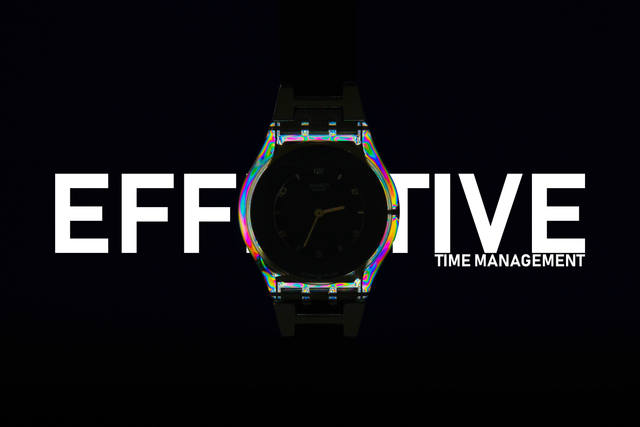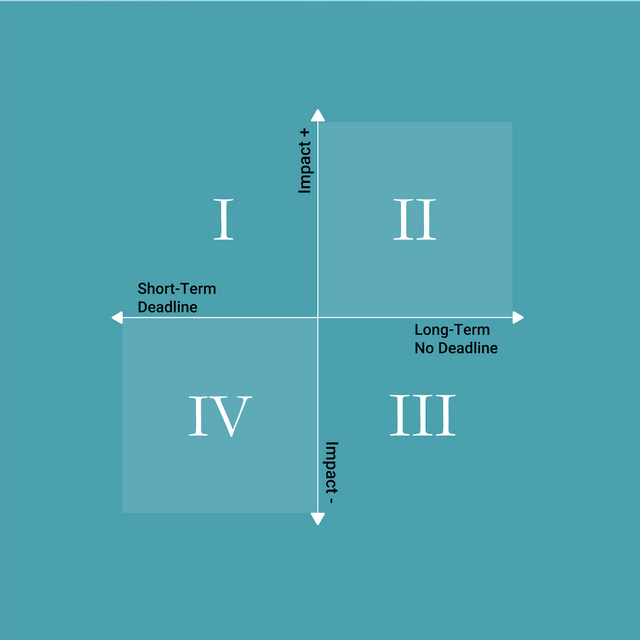How-to: Crazy effective time management
Introduction
Everybody wants to have a good time management since everyone knows how critical it is to get stuff done. Some people already have a system in place to manage their time effectively, few with such a system in place adhere to it, and only a minority uses successfully time management skills too tackle not only work but also other life domains.
In this blog post, I want to share the time management knowledge and principles that I acquired from some of the best minds of the world. When applying those principles myself, I think I have a pretty solid time management, if not, it is pretty crappy and not satisfying at all. So being consistent and adhering to a system is critical, also for me.
In the first part, the what part, we will set the stage, so everybody is on the same page and has the same understanding and framework when it comes to proper time management. In the second part, the how part, we will talk about some implementation strategies. However, the understanding of the concept is much more critical. This does not mean that you just have to understand the principles and have acquired good time management, but instead that you should over time create a suite of tools which works best for you.
What Part
The two words which come to mind first and are often introduced as part of a time management system are the terms urgent and important. If you are not familiar with these terms, you can find some information searching for Eisenhower priority matrix. Even though the underlying principle of having four quadrant remains the same, we will not use these two terms to define tasks because, quite frankly, I do not like them.
Why? Well, how to define what is important and what is urgent? Often it is not so easy to find a definite answer to those questions. Instead, I would like to introduce the concept of deadline/no deadline or thinking in short- and long-term goals and on the other hand high impact vs. no/low impact.
The following graphic illustrates the relationship between the two newly introduced terms. Let's go quickly over the four quadrants.
Quadrant Ⅰ: High Impact & Short-Term/Deadline
Those are usually tasks right in front of you which have an impact and need to be completed as soon as possible. The good thing about those tasks is that these are easy to categorize since the task at hand is screaming at you.
Moving forward we will not focus on those tasks since they are obviously impactful and need to be done. We will, however, talk about this quadrant a little when it comes to determining how to spend your time wisely.
Quadrant Ⅱ: High Impact & Long-Term/No Deadline
This quadrant should be of utmost importance to us. In this category, there are all of those long-term tasks which would be beneficial, for example, for our health like eating healthy or exercising regularly. Your workplace or perhaps your own business strategic planning falls into this category.
Having a plan for the weeks, months and possibly years to come and trying to work on the tasks which influence the goal or vision in the future is very important, but at the same time not easy. Jeff Bezos is a master of this art. He said he likes to focus on one project for 7 years and dedicate everything he has to it. That is long-term focus at his finest.
Quadrant Ⅲ: Low Impact & Long-Term/No Deadline
Here we find activities with low or no impact and no deadline. You should not focus at all on tasks in this category. We will not talk about this category moving forward since a minority of tasks can really be situated in here. Furthermore, it should be easy to discontinue tasks which fall in this category.
Quadrant Ⅳ: Low Impact & Short-Term/Deadline
In this quadrant, we find most of the daily tasks and basically all kind of distractions. When completing tasks, this should give us a certain feeling of having accomplished something at the end of the day, but we usually do not have this feeling with the actions found in this quadrant, because the stuff done is just not really impactful.
Activities could be watching useless YouTube videos, any type of notification that distracts us, allocating a tremendous amount of time for filing away emails or unnecessary chatting with colleagues at work who want to pick your brain.
I already hear some people explaining themselves: "But I need to write constantly emails to keep everything running", "I have to be into Facebook 24/7 to keep my business running" or "I have to talk to my colleagues to build up relationships". I agree that all of those tasks can have an impactful purpose but you should not confuse your productivity by being "on" 24/7. Being busy does not mean you are productive.
At the end of the day, if you can measure positive results from the tasks you are doing, you are doing things right. If however, after an honest evaluation, you see that much of the time is spent with nonsense tasks, you know that you obviously spent too much time with distractions.
Question: So what is good time management about?
Answer: Spending as much time in Quadrant Ⅱ instead of the spending time with distractions in Quadrant Ⅳ.
The question is now: When is the right time to
- workout?
- stop smoking?
- spend time with your family?
The problem with those things is that they do not have a definite timeline! We will explore some of the reasons in the next paragraphs.
Deadlines, pleasure, and distractions
One of the best inventions of life is death because it sets a definite end - to everything. The philosophical question if we, as human species, would really have achieved as much as we have of today without a fixed end to life, remains, but experiments show that with a definite end in mind or instead right in front of you, human behavior is triggered to achieve and complete the tasks at hand quicker and better as without.
In an experiment a group of students was given a project to work on. The project was reasonable to complete within one week. The students have been separated into three groups: A one week, a one month and a one year group. Even though the one year group had obviously the most amount of time to finish the project, the group which performed best has been the one week group. Why? Because they had the most apparent end in mind and could literally see it.
Let's now explore a second interesting human behavior which is the reward to loss or pleasure to punishment? ratio. In a lot of experiments, there/it has been shown that a ratio of 1:5 exists within each of us, meaning we dislike losing five times more as we enjoy winning. Just think about the worst thing someone with excellent time management might say: "I am too late" which equals a punishment or rather a defeat and we all hate this.
Distractions play a significant role in our lives and are mainly contributing to not reaching our most impactful tasks. But why do we fall into the trap of those time killers which only waste valuable time (and often brain cells, too)? Because of our human biology.
Nature meant really well, and equipped us with a set of hormones namely Dopamine, Serotonin, Oxytocin, Endorphin. Those hormones have been beneficial to survive the last 300.000+ years but are now mainly the reason why we e.g. love social-media and fake news so much.
The problem is that we cannot trick our biology because our bodies are what they are. However, we have some tools to flip this phenomena around which will help us to focus on no-deadline items with high impact.
As described in the prior paragraphs we have to, first and foremost, bring the deadline really close, and secondly, we need to define and intensify the pain related to a task. Think about what you are going to miss out because of not doing your daily whatever. You can and should be a bit pessimistic about it since this will sharpen the focus.
Charlie Munger: “Successful people think in opportunity cost.”
Three life domains
Now let’s introduce three different life domains:
- A - Self-care
- B - Relationships
- C - Work
When people get asked to rate those topics from the most important to least significant often the rating goes like this: C - Work first, B - Relationships second, A - Self-care third.
This rating can be flipped around easily if given some new information.
Let's assume you are close to a heart attack, your relationship is about to fall apart, and your business is failing, or you are likely to get fired. Now think again and review your previous rating. In most cases, the score now changes to self-care, relationships and lastly work. Why? Because we have brought the deadline/timeline really close, so now everything has a more explicit endpoint.
So remember that bringing the deadline really close is always a way to truly understand the impact of a task.
How Part
First, you need to understand how valuable your time really is. Everybody knows the saying: "Time is more important than money. You can always get more money but not more time". For the majority of people, however, time remains this abstract thing. Money, on the other hand, is understood, at least the value is easily understandable.
To prioritize your time regard it as money. Imagine you are the CEO of your own Life Inc. company - how would you budget your money? Which quadrants would receive your attention first and which one last? To drive success, those are important questions which need to be figured out.
The following ranking is my non-negotiable list. I always try to follow this logic whereby, of course, category one and two get the bulk of my budget or attention.
- Short-Term / Impact +
- Long-Term / Impact +
- Short-Term / Impact -
- Long-Term / Impact -
Coming back to the three life domains we introduced earlier: Self-care / Relationship / Work. The process is now to fill tasks/to-dos from those domains in the quadrants and so allocating time for it.
As already mentioned I would recommend to fill or budget your time in the self-care category first, then the relationship and after this follows work.
One caveat to this process: Of course, there will be some compromises from time to time. We are all human beings, and our lives are not static, so the way you should prioritize your tasks depends on the season in life and what the situation is you are currently in.
What do I mean by that? Just think about sleep and a work-related project. I guarantee you that there will be the time when sleep is sacrificed in order to finish that really impactful project, and the good thing is: That is totally okay. But keep in mind that this should be an exception and not the rule. The key is to revert back to the default setup.
In one sentence: The above order is not negotiable but what you put in those categories is (e.g. a project at work, a family event, sleep...). Ideally, you should focus on yourself first then your relationships with others and then work.
Toolbox
This last paragraph will introduce some tools to achieve all the above. Of course, this is not a complete list but should instead be seen as a teaser you can elaborate on. In the end, the how is not so important as the what and why. If you know what and especially why you are doing things, the how will just be a nuance and lastly entirely depends on personal preference.
Reflection: This is a powerful tool, and it should be obvious why it is essential and how it can help you. There are, of course, different ways to reflect but what is critical is that you have to find the frequency you need. For some people a quarterly and a yearly reflection might be enough, for others a monthly, a quarterly and an annual are essential to reflect and adopt tasks to the season in life. Others may want to add a weekly 10-minute reflection, done on Sunday evenings or early Monday mornings. Again, this is entirely up to you. I would suggest starting with at least quarterly and yearly reflections preferably also monthly ones.
Notifications: email, messenger, social media. One advice I would give you is to turn off everything. This gives you, as user, the power to decide when to spend time on Twitter, for your emails, Instagram and so on. Saying you are not looking at a message when the notification pops-up is possible, but subconsciously this will trigger you. Trust me, turning your notifications off will give you more peace of mind and freedom.
Pareto principle: The majority already knows the Pareto principle. If not, you can look it up by a quick search. Put in simple terms, Vilfredo Pareto found out that there is a relationship between cause and effect of 20% to 80%. One simple example is that 20% of the goods a company sells are responsible for 80% of the overall sales. This principle is applicable to your tasks: 20% of your tasks in one life domain account for 80% of the impact in this category. What the minority does not know is that the 20/80 correlation can be further drilled down. Going deeper the following percentage ratios can be derived. A 4% to 64% correlation and with one more step we reach a 1% to 51% ratio. So your mission should really be to find the 1% of your tasks which will have a 51% impact.
You need to say "No" to 99% of the things which come your way to find and focus on the 1% which accounts for 51% of the impact.
Your natural biorhythm: Find your natural biorhythm but do not fluff around (morning person, evening person). Do not say you are an evening person, thus you wake up late. But in the evening you spend your time with binge-watching a new series. You need to do the work.
Rituals/Routines: Develop rituals which help you to come into the flow. The human body is perfect in triggering such behavior. Find out what works for you. You can search for inspiration on the web. You will find a lot of input with regard to rituals. Also, how do you want to schedule your gym time, your time with friends or the time with your significant other? I, for example, like to schedule one day for my relationship. Meaning on this day I just focus on this. That could be different again for other people.
Three steps to beat procrastination:
- Shift your focus → for example, focus on your breath for a couple of minutes
- Body position → change place, go for a walk, jump around
- Language (what are you listening to, which words are you using) → Listen to music which motivates you, watch an inspiring clip, positive self-talk
The End
I hope this blog post will really help you to improve your time management skills and to focus on the tasks that matter most. Not only with your day to day work but also outside of this domain. Just don't be so hard with yourself and try to implement everything immediately. Especially long-term thinking and planning is a skill you need to hone for a very long time, and here we are talking about months if not years.
The goal is a steady improvement to grow continuously. If you have read until the end, you have already taken step one for the journey. I encourage you now to take step two and work each day on the principles above, and I am sure that you will have a beautiful and abundant life in all of the life domains.
To make sure you don't miss any more updates, subscribe to this blog. Here are some links to my various social media channels — looking forward to seeing you there.
Follow me:
- http://youtube.com/julianhosp for regular videos
- http://twitter.com/julianhosp for daily updates
- http://instagram.com/julianhosp for insights into my everyday life
- https://julianhosp.com/kryptoshow-podcast/ for my crypto show as a podcast
Until next time — Be #cryptofit,
your Julian
Dr. Julian Hosp is the co-founder of TenX, blockchain expert in numerous working groups of the EU parliament, TEDx speaker and bestselling author of multiple books. His website is: https://julianhosp.com




Congratulations! Your post has been selected as a daily Steemit truffle! It is listed on rank 19 of all contributions awarded today. You can find the TOP DAILY TRUFFLE PICKS HERE.
I upvoted your contribution because to my mind your post is at least 4 SBD worth and should receive 104 votes. It's now up to the lovely Steemit community to make this come true.
I am
TrufflePig, an Artificial Intelligence Bot that helps minnows and content curators using Machine Learning. If you are curious how I select content, you can find an explanation here!Have a nice day and sincerely yours,

TrufflePigThe illustrate is really good. I will draw it, put some goals and catch some "clouds" to use it as a mind-map. Let's see what will happen.
Greets
Congratulations @julianhosp! You received a personal award!
You can view your badges on your Steem Board and compare to others on the Steem Ranking
Vote for @Steemitboard as a witness to get one more award and increased upvotes!